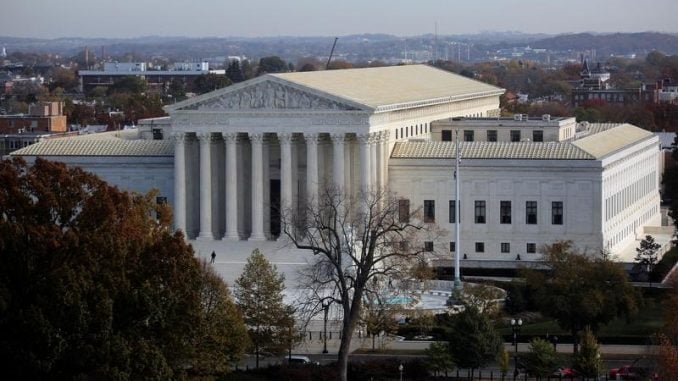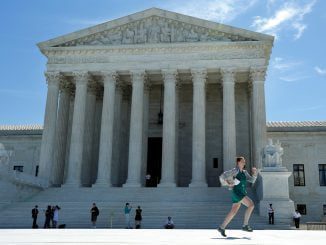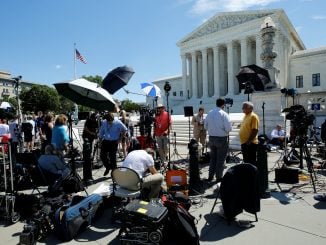
RALEIGH — On Friday morning, Rep. Dan Bishop (R-NC-9), Judge Phil Berger Jr., and NCGOP Chairman Michael Whatley held a teleconference to discuss the current Supreme Court vacancy following the passing of Justice Ruth Bader Ginsberg.
Bishop said that the president’s announcement on Saturday represents “a historic opportunity” to fulfill another promise President Trump made in 2016.
“Very much front and center in the president’s case for re-election was the appointment to the Supreme Court of judges who would respect and follow the Constitution and not use positions as one of the nine to make law, which is a task of Congress,” said Bishop.
Bishop said Saturday’s announcement was an “exciting opportunity” to bring a “reliable constitutionalist majority” to the nation’s Supreme Court. He also commended the president’s decision to move along with the nomination process.
Addressing complaints by Democrats that the seat should not be filled prior to the election, Bishop said there is “no hypocrisy” in filling the seat.
“It has always been the case that in election years it is very rare for a Senate of the opposite party from the White House to confirm a nomination to the Supreme Court,” said Bishop. “And correspondingly, when there has been unified government between the Senate and the White House, those nominations generally have gone forward.”
“The president is entirely correct to move on with this,” Bishop said, adding that North Carolina Sen. Thom Tillis is one of the “critical majority” who will “vet and send to the floor” the president’s nominee.
“The constitutional roles for the president to nominate and the Senate to provide advice and consent are critical, contested and they are not calendar dependent,” said Judge Phil Berger Jr., who is one of three Republicans running for a seat on the North Carolina Supreme Court.
Berger said that the “plain language of Article Two” answers the only question that matters, and that’s “the president’s authority to fill a vacancy to the Supreme Court at any time during his term in office.”
“Article Two, Section One says the president shall hold office for a term of four years,” Berger said. “There’s no Constitutional limitation on the exercise of executive power during the President’s term — not for an impending election or even in a or a lame-duck presidency.”
Berger went on to say that the president takes an oath of office which includes the duty that he “shall nominate and, with consent and advice from the Senate, shall appoint judges of the Supreme Court.”
“President Trump, and in fact every president, not only has the authority but an obligation to nominate someone to fill a vacancy on the Supreme Court,” said Berger, adding that it’s apparent the president plans to fulfill that obligation on Saturday.
Berger said that “at least 15 times” a vacancy on the Supreme Court has arisen during an election year and that the president each time made nominations to fill the vacancy. He reiterated some of Bishop’s comments regarding times when there was a nomination with the opposition party to the Senate in the White House and that the “overwhelming majority” of those nominations were not confirmed.
“Eight of those 15 times, voters had a Senate majority of the same party as the president,” said Berger. “The overwhelming majority of those nominees were confirmed.”
Presidents who have made election-year nominations include Presidents Obama, Eisenhower, George Washington and Thomas Jefferson, Berger noted. He also cited post-election nominations by Washington, Adams and Grant.
Berger said there is plenty of time to fill the vacancy, citing the late Justice Ginsberg was confirmed in 42 days, Justice Stevens in 19 days and Justice O’Connor in 33 days.
On a question from media about whether it would help Tillis’ re-election to fill the vacancy before or after the election, Bishop said that the impact on that Senate race was a “secondary concern.”
Bishop is also concerned about the impact court vacancies will have on things like the recent absentee ballot consent order entered into by the Democrat-controlled N.C. State Board of Elections.
“Issues like that sort of tricky litigation are going on all over the country,” said Bishop. He said that these kinds of suits were a driving factor in making sure there was a full complement of justices on the Supreme Court and avoid rulings that may end in a “four to four tie.”
Bishop also underscored that President Trump was elected in part because people want to see a reliable constitutionalist on the court. He said that reason ties into the Tillis race.
“I’m sure people can remember what the Democrats did to Justice Kavanaugh,” said Bishop, and that people should remember the “unbelievable, inappropriate attacks on the process and nominees” that were used to try and derail filling a vacancy.
Alluding to the attacks on the religious affiliation of potential nominee Amy Coney Barrett, Bishop said we should “be prepared” for more of the same.
“I am sure we will see some of the most blinding religious bigotry we have ever seen in the halls of the United States Senate when this nomination comes forward,” said Bishop. He added this nomination could be a defining element of the president’s re-election and that of those running for senate.
NCGOP Chairman Michael Whatley also responded to the question about the nomination’s impact on Tillis’ senate race.
“He’s been a member of the Senate Judiciary Committee his entire term,” said Whatley of Tillis. “He has helped to usher over 200 lifetime conservative federal judicial appointees through the Judiciary Committee, including two of them that are on the Supreme Court — Neal Gorsuch and Judge Kavanaugh.”
Whatley said Tillis is an “integral part” of the conversation that will take place and that whether the vote takes place before or after the election isn’t as important as his role in the process.
“It’s really going to shine a spotlight on his role in remaking the federal judiciary over the course of the last six years,” said Whatley.
North State Journal asked if there were any thoughts from the call participants that the presumptive nominee might not be Barrett, but instead Judge Barbara Lagoa.
Bishop said he didn’t know who the president will pick, but that Trump has been “very upfront” about the type of people he would pick. He said Barrett was his favorite, but that the president “may not pick her.”
“The President has a history of appointing conservative, originalist judges to our federal courts,” Berger said. He said whether it was Barrett or someone else from the list of nominees, that it will be “good for the country.”
Whatley echoed what Tillis said last week, which is that any of the nominees would be qualified.
When asked about whether the Supreme Court nomination will have an impact on raising awareness of North Carolina judicial races, including the state Supreme Court, Whatley said, “Absolutely.”
“I think it is a great thing for our candidates who are running for the Supreme Court, the court of appeals and frankly, our district court and superior court judges,” said Whatley.
The NCGOP chairman went on to say that there needs to be some “serious discussion about the judiciary in North Carolina,” citing the current disposition of the state Supreme Court which sits at six Democrats to one Republican.
“We are seeing a number of decisions that are contrary to actions that are taken by the legislature and the governor, and we need to have conservative judges on the bench,” said Whatley.
Bishop agreed with Whatley that state judicial races are very important and said that North Carolina has the “most liberal extreme Supreme Court in the nation.”
“They are either adhering to the Constitution or they’re not,” said Bishop about whether judges were liberal or conservative.



